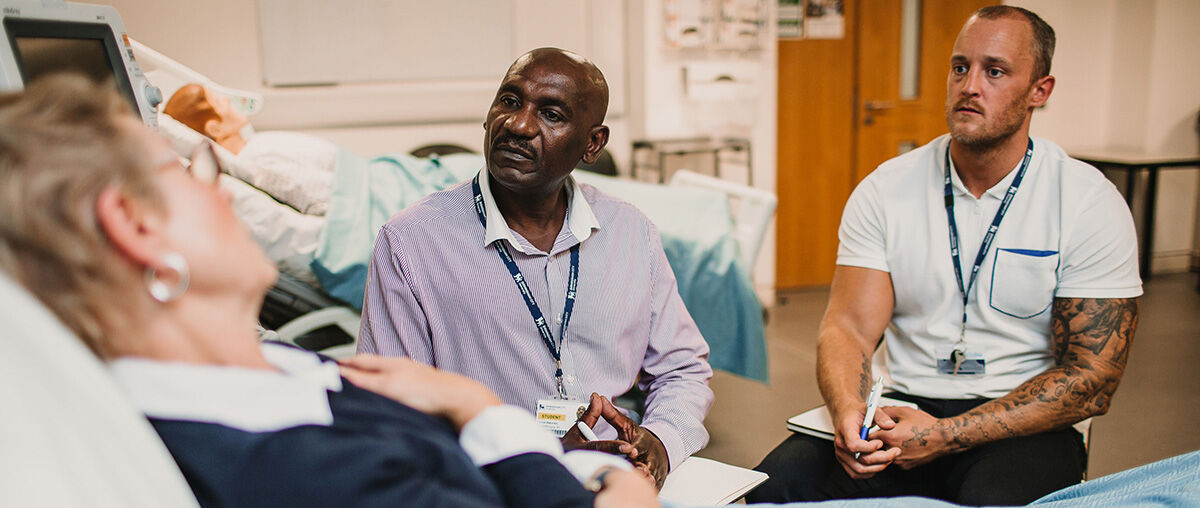
Social Work (Degree Apprenticeship) - BSc (Hons) / PgDip
Currently viewing course to start in 2025/26 Entry.
The Social Work Integrated degree apprenticeship is a work-based integrated degree. On completion, you will be eligible to apply for registration as a social worker with Social Work England.
- Level Apprenticeship
- Study mode Blended Learning
- Award BSc (Hons) / PgDip
- Start date September 2025
- Subjects
- Location City South
This course is:
Overview
The Social Work Integrated degree apprenticeship is a work-based integrated degree. On completion, you will be eligible to apply for registration as a social worker with Social Work England.
The Integrated Degree Apprenticeship is a qualifying route into professional social work practice. We offer two degree apprenticeships for Social Work:
- A three-year BSc (Hons) course
- A 27 month Postgraduate Diploma (PGDip)
You will study for the award over the period of the course, while remaining employed with one of our partner agencies. Apprentices are released to undertake academic learning with us at BCU and carry out their practice placements with their employer.
We have over 50 years' experience in training people to become social workers in the super-diverse and cosmopolitan city of Birmingham. If you want to become a professional social worker, successful completion of this course will enable you to work with children and adults in a range of social work settings and make you eligible to apply for registration with the regulator, Social Work England, to obtain the protected title of ‘Social Worker’.
Approximately half the programme involves direct practice experience through defined work-based professional placements. These are provided by our employer partners in the second and third years of the BSc course and both years of the PgDip. On placement you will be supported by a team including a dedicated and qualified practice educator who will always be a registered social worker. Defined Placement days will be considered to be off the job training and learning days so that apprentices are considered as students rather than solely employees. At least one of your placements will be within a statutory setting, providing experience of sufficient numbers of statutory social work tasks involving high risk decision making and legal interventions.
As a requirement of apprenticeships is to review safeguarding and British values, this is integrated into the off the job learning curriculum. The British values cited are:
- Democracy
- The rule of law
- Individual liberty
- Mutual respect and tolerance (Department of Education 2014)
As these values align with those of social work itself, there are ample opportunities within the apprenticeship for these to be evidenced. Apprentices are able to evidence their progress against Safeguarding, Prevent and British values through on- and off-job learning. This will then be discussed at each progress review.
Outside of placement, at least 20% of the course (equivalent to the ifATE standard of an average of six hours per week) will be delivered by us at the University as off-the-job learning. The remaining 80% of the time apprentices will be in work-based learning.
For more information, see the course specifications below:
Download the BSc (Hons) course specification
Download the PGDip course specification
How to apply
You cannot apply directly to the University for a degree apprenticeship. To be eligible for an apprenticeship, you need to be employed in a suitable and relevant job and meet the entry requirements.
If you are currently working at an employer who is offering an apprenticeship, your employer would need to contact apprenticeship-enquiries@bcu.ac.uk to nominate you, and they will then be provided with the relevant documents and paperwork.
If you are not currently employed in an organisation that offers apprenticeships, you can search for opportunities on the Find an Apprenticeship website.
Contact us
If you have any questions about this apprenticeship route, please contact our Apprenticeships team at apprenticeship-enquiries@bcu.ac.uk.
What's covered in this course?
During the apprenticeship you will experience student-centred academic learning on campus, work based learning and two placements of 70 and 100 days.
Academic learning will include a carefully blended mix of face-to-face lectures, workshops and seminars, complemented by online resources.
In addition to practitioners and academics from other relevant disciplines, teachers include experienced social work academics, practitioners, who are currently in practice and service users and carers who are experts by experience.
They will assist you to obtain the knowledge, skills, values and professional capabilities you need for successful social work practice in today’s world. This includes legal, theoretical and research knowledge, the core skills of reflection, assessment, communication, resilience, report writing and leadership, and the values of being empowering, person-centred, strengths-based, results and outcomes focused.
Our experienced academic staff have worked in a variety of social work teams and settings including child and adult safeguarding, foster-care, physical and learning difficulties, sensory impairment, and mental health and hospital social work.
How will I study?
As an apprentice on this course you will be released by your employer to study part-time at university while having exposure to practice placement settings.
As part of this you will complete 30 skills days across the course as well as a 70 day placement and a 100 day placement.
In university, you will experience a mixture of face-to-face and virtual teaching, self-directed study and practice-based clinical placements.
On the job, you will engage with practice partners and service users to learn the knowledge, skills and behaviours required to become eligible to register as a social worker.
Accredited By
This course is accredited by:
Applications
Candidates will apply for this apprenticeship through an employer organisation, and their application will be assessed by both the employer and the social work academic team at Birmingham City University.
Entry requirements
This is not an exhaustive list of qualifications so please contact your employer for further clarification.
Why Choose Us?
- Benefit from 170 days of practice placements and 30 skills delivery days.
- Apprenticeships offer work based learning – the opportunity to build on existing knowledge and skills.
- You will be supported by highly experienced tutors and work based mentors to support you both with your studies and in practice.
- We have excellent facilities on campus including state-of-the-art equipment, study spaces and an extensive library of learning resources to support you with your studies.
- Study alongside other individuals who have experience within your industry. You will be able to build valuable networks, sharing best practice and supporting you with your future career opportunities.
- At the end of the course, you will have three years work experience, and a degree-level qualification, without taking on any student debt.
Facilities & Staff
Our facilities
Social Work and Communities is based at our City South campus in leafy Edgbaston.
We’ve spent £41million expanding the education facilities at City South. These facilities offer hands-on practical experience, replicating the spaces you will come across in professional practice. Alongside classrooms and lecture theatres, we also have a range of specialist teaching and learning spaces for specific subjects including science, design and technology, drama and physical education.
As well as subject-specific rooms, our facilities include the Primary Innovation Lab, which houses £24,000 worth of LEGO. This room is a special resource for our education students, offering an innovative and creative way to approach subjects across the curriculum – from computing to English, mathematics to art. The lab responds to research that children and young people learn best from practical experience.
Our Social Work students have access to a home environment room and mock hospital wards which offer an opportunity to gain experience of working with service users in different situations.

Computer facilities
The Seacole building has two open-access IT Suites which offer PCs, printers, photocopiers and scanners. There is also an IT Helpdesk for quick and easy help with your computing or internet issues.
Our PCs utilise the latest Intel i5 core technology, all with:
- Fast (unrestricted) internet connectivity
- Ability to save files to USB, DVD & CD
- Microsoft Office software
- Research and statistical software
- Storage space which can be accessed from any PC across the University and from home
Our PCs are also designed to support students who may have difficulties with reading and writing, featuring specialised software with zooming/magnification and screen reading capabilities, which may also be customised for individual student needs.
In addition to desktop PCs, we also offer a laptop loan facility, allowing students to borrow a laptop for up to six hours while on campus.
Our staff
Simon Hall
Senior Lecturer
Simon qualified as a social worker in 1995 and has worked as a practitioner and manager in most adult service user groups. He has also managed post qualifying social work training provision within a local authority for a number of years.
More about SimonCaroline Lee
Associate Professor and Subject Lead for Social Work
Caroline qualified in 1999 and first practiced as a generic adult social worker in Warwickshire before moving on to the Learning Disability Resettlement Team in Birmingham in 2002. In 2004 she qualified as an Approved Social Worker and continued to specialize in working with adults with a learning disability accessing forensic services, before...
More about CarolineDr Peter Simcock
Associate Professor of Social Work
Peter began working in social work education in 2010 and joined the Department of Social Work at BCU in January 2018. Prior to working in academia, Peter worked for Age Concern, Hull, before moving to the West Midlands and from 2001 to 2008 worked for Wolverhampton City Council in various social work roles including social worker within a...
More about PeterJessica Wagner
Senior Lecturer in Social Work
After qualifying from the University of Wales in 2003, Jessica has spent the majority of her professional experience within statutory children’s services, where she held posts both as a practitioner and manager in safeguarding teams. This allowed her to gain experience of working in child protection and child in need services and through the...
More about Jessica